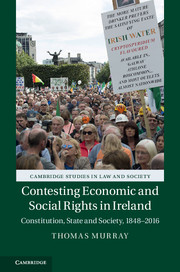Book contents
- Frontmatter
- Dedication
- Contents
- Acknowledgments
- Introduction: The Politics of Economic and Social Rights
- 1 Constitution ‘from Below’ in Ireland: 1848–1922
- 2 ‘Not Alone Personal Liberty but Economic Freedom’: Socio-economic Rights in the Making of the 1922 Irish Free State Constitution
- 3 ‘Highly Dangerous’? Socio-economic Rights in the Making of the 1937 Irish Constitution
- 4 Contesting the Irish Constitution and the World-System: 1945–2008
- 5 The Polarities of Justice and Legal Business
- 6 Contesting Property Rights
- 7 Contesting Trade Union Rights
- 8 Contesting Family, Education, andWelfare Rights
- 9 Reproducing the Value-Consensus State
- 10 Constitution ‘from Below’ in Ireland: 1945–2008
- Conclusion: Contesting Economic and Social Rights Today
- Bibliography
- Index
5 - The Polarities of Justice and Legal Business
Published online by Cambridge University Press: 05 August 2016
- Frontmatter
- Dedication
- Contents
- Acknowledgments
- Introduction: The Politics of Economic and Social Rights
- 1 Constitution ‘from Below’ in Ireland: 1848–1922
- 2 ‘Not Alone Personal Liberty but Economic Freedom’: Socio-economic Rights in the Making of the 1922 Irish Free State Constitution
- 3 ‘Highly Dangerous’? Socio-economic Rights in the Making of the 1937 Irish Constitution
- 4 Contesting the Irish Constitution and the World-System: 1945–2008
- 5 The Polarities of Justice and Legal Business
- 6 Contesting Property Rights
- 7 Contesting Trade Union Rights
- 8 Contesting Family, Education, andWelfare Rights
- 9 Reproducing the Value-Consensus State
- 10 Constitution ‘from Below’ in Ireland: 1945–2008
- Conclusion: Contesting Economic and Social Rights Today
- Bibliography
- Index
Summary
From 1961 onwards the Constitution became very much part of life and its impact could be felt among the ordinary people, who suddenly became conscious of the fact that they had a constitution, that it could be implemented and that, in fact, many parts of it were self-executing and did not require any supporting legislation. The consciousness of this suddenly burst upon the public and it just happened to be that, in the years commencing around about 1960–61, the court, for a variety of reasons, became very active. The most important reason was that it got the cases. The court is not self-starting and depends on cases. So it was a happy coincidence of the right cases coming along at a time when the court was most receptive to new ideas.
– Judge Brian Walsh, 1988For a case to come to court there must be a dispute and there are rarely disputes involving an unfortunate child being committed to residential care. If the child has no parent or legal guardian, there is no one to dispute what the State does; if there are parents, they usually consent or, if they do not consent, they are not concerned or, if they are concerned, they are not aware of their and their children's constitutional rights or they cannot afford a lawyer who will help them to legally enforce such rights…
– Michael O'Mahony, solicitor, 1971The legal-political positions that judges, barristers, and commentators took on socio-economic rights had definite histories; they were not simply choices between abstract, equally valid ‘principles’. Socio-economic rights discourses and decisions cannot be understood independent of the particular working conditions in which they were generated or, more generally, the wider social conditions to which they referred. Ireland's changing court structure, the specific field within which socio-economic rights cases were contested, registered and reproduced the transformation and antagonisms of the historical capitalist world-system. In particular, the litigation explosion occasioned by capitalist modernisation in the 1960s and neoliberalisation from the 1980s onwards had important implications for the rationalised reconfiguration of legal professional activity or ‘business’.
Ongoing contradictions within the court structure, functioning simultaneously as a site of business and justice, had at least three important, inter-related implications. First, judges faced mounting pressures between traditional adjudicatory norms and the demands of increased administrative rationalisation.
- Type
- Chapter
- Information
- Contesting Economic and Social Rights in IrelandConstitution, State and Society, 1848–2016, pp. 187 - 208Publisher: Cambridge University PressPrint publication year: 2016



